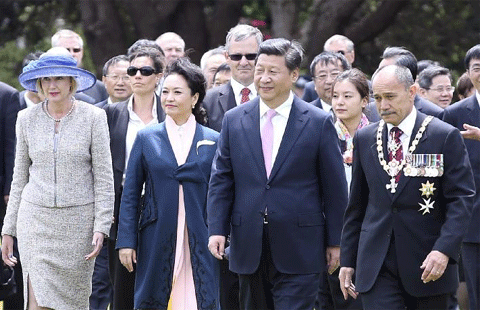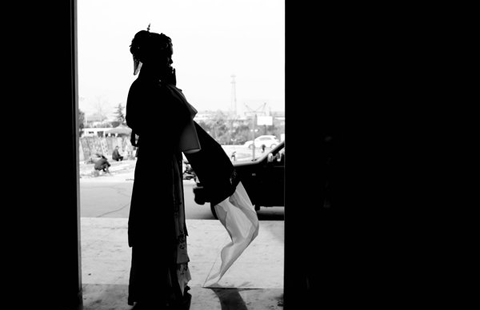Li reviews health of economy
Updated: 2014-11-21 10:42
By Zhao Yinan in Yiwu, Zhejiang and Chen Jia in Beijing(China Daily)
|
||||||||
 |
|
Premier Li Keqiang holds a traditional rattle given to him by a businessman at Yiwu International Trade City, Zhejiang province, on Thursday. He said the gift will be preserved at the National Museum of China as it represents the spirit of Yiwu. [Liu Zhen / China News Service] |
Visit to market comes as key factory output indicator drops to 6-month low
Premier Li Keqiang visited China's largest wholesale commodity market on Thursday, taking the economy's pulse as a key factory output indicator slumped to a six-month low.
Some experts called for more fiscal and monetary easing, though others said the decline is a temporary result of the closure of factories during the Asia-Pacific Economic Cooperation meeting.
Li visited shops and booths at Yiwu International Trade City in Zhejiang province to ask about the difficulties they face.
Tamer Noman, a Yemeni businessman who has lived in Yiwu for 15 years, said he has felt the impact of declining orders in recent years, but remains optimistic.
"I still believe that the market is good in China," he added.
Li urged traditional businesses to embrace new trends such as e-commerce, rather than resisting them, to attract more customers and ensure their survival.
He said e-commerce has become the new driving engine of the Chinese economy because of its ability to boost consumption and create jobs.
The government must support the development of e-commerce even though its growth may clash with the interests of the traditional commerce sector, he added.
Experts said Li's trip to Zhejiang, which will continue until Friday, is likely to be the last fact-finding visit before the country's top decision-makers convene for their annual closed-door meeting in December to draw up economic policies for 2015.
The visit came on the day the HSBC Flash China Manufacturing Purchasing Managers' Index, an important economic indicator, fell to 50 from 50.4 in October - significantly lower than the 50.3 forecast by analysts.

 Jack Ma shares tips at Internet summit
Jack Ma shares tips at Internet summit
 President Xi attends welcoming ceremony in Wellington, New Zealand
President Xi attends welcoming ceremony in Wellington, New Zealand
 Car-rental firm revs up Wall Street
Car-rental firm revs up Wall Street
 Cui hails Obama's China trip
Cui hails Obama's China trip
 Peek into the life of Puju performer
Peek into the life of Puju performer
 Top 10 most powerful businesswomen in China
Top 10 most powerful businesswomen in China
 Top 10 most powerful businesswomen in China
Top 10 most powerful businesswomen in China
 Love conquers leprosy in Luduo village
Love conquers leprosy in Luduo village
Most Viewed
Editor's Picks

|

|

|

|

|

|
Today's Top News
Deng Long: New York supermarket king
China wants its voice heard in cyberspace
New Zealand welcomes Xi
Alipay brings the frenzy of Black Friday to China
Emission goals in China on target for 2020
Li positive on govt-Qualcomm resolution
E-commerce will change global trade: Jack Ma
Jack Ma shares tips at Internet summit
US Weekly

|

|








